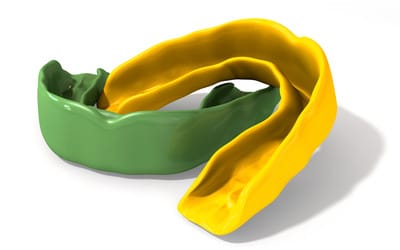Mouth Guard
We recommend always wearing a custom-made mouth guard when playing sports to avoid or minimise injuries to the tooth.
Why should I wear a mouth guard?
If you take part in a sporting activity, particularly contact sport, your chances of a facial or tooth injury are high. Our dentists see sports related teeth injuries often and a mouth guard could prevent these nasty injuries.
You can get a knock or a bump on your teeth while playing the sport. The severity of the blow will determine the survival of the teeth. After the blow, the teeth may look healthy, but after some time, the nerve or pulp may die.

When the nerve or tooth dies, the tooth may become dark or you may get an aching tooth. The time period for this is very difficult to predict. It may take 6 months, 10 years or even longer. If the nerve or pulp is infected, you’ll have to do a root canal filling or nerve filling.
In most cases, after a root canal treatment, a porcelain crown or a full porcelain cap is placed on the tooth to mask the colour. A crown will make the tooth strong and prevent it from fracturing. In some cases, the root underneath the gum will dissolve or resorb due to the impact and infection. The type of treatment depends on the type of injury and some injuries require lengthy treatment.
What types of tooth injury/fracture may occur during sport injury?
- Small chip on the tooth.
- Half of the tooth shattered.
- Tooth breaks at the gum margin.
- Root fracture.
- Fractured bone around the teeth.
- Loose tooth or teeth.
- Teeth pushed into the gums.
- Tooth gets completely knocked out (can be knocked out either from the socket or mouth).
Another reason to wear a mouth guard is to prevent teeth grinding. This type of guard is different to a sports one and is often called a “ night guard” or “occlusal splint”.
What kinds of sports mouth guard are available?
1. Custom-made mouth guard which the dentist makes.
2. Over the counter mouth guard which is a standard size. You can buy these from various shops.
We recommend custom-made ones as they fit you better. It is also important to protect your teeth against injury when you wear braces.
Difference between custom-made and over the counter mouth guards?
1. Custom-made Mouth Guards:
- The dentist provides these. The dentist makes a plaster model of your mouth and sends it to the lab. The lab technician uses the model to make your guard.
- We can make these in different colours, even your favourite sports club colours.
- When you pick up your mouth guard, the dental professional will ask you to try it on to check the fit.
This type will:
- Feel comfortable
- Fit very well
- Cover optimal area
- Provide adequate protection
- Sit evenly.
2. Bought from the shop (over the counter):
As these are not custom made to fit you, they often:
- won’t fit well
- will be uncomfortable to wear
- Won’t give full protection to the teeth
- will be loose, resulting in discomfort while playing sport
- will feel bulky, which makes breathing difficult.
How to take care of your mouth guard?
- After each use, clean it under cool running water.
- Use your toothbrush to clean it. If your toothbrush doesn’t reach all areas, use a smaller brush head.
- You can use toothpaste, soapy water or a commercial cleaning solution available at the supermarket or chemist. If you use a cleaning solution, please follow the manufacturer’s instructions.
- Do not use bleach-based cleaners.
- The cheapest way to disinfect is to use a solution of one part white vinegar mixed with 20 parts water. Place it in the solution for 15-20 mins. Remove it from the solution and rinse it thoroughly under cool running water.
- Keep it ventilated in a container or mouth-guard case.
- Keep it in a cool, dry place when not in use.
- Avoid using hot water to clean it.
- Avoid exposing it to heat or leaving it in direct sunlight for prolonged periods.
Depending on the frequency of use, adults can use their mouth guards for several years. As children’s mouths are developing and growing, children need to replace their mouth guard each year. This will provide optimal protection while playing the sport.
We advise checking your mouth guard regularly for any damage and replacing it if it is damaged.
If you need more information on mouth guards, please contact our friendly Bendigo Dental dentists.